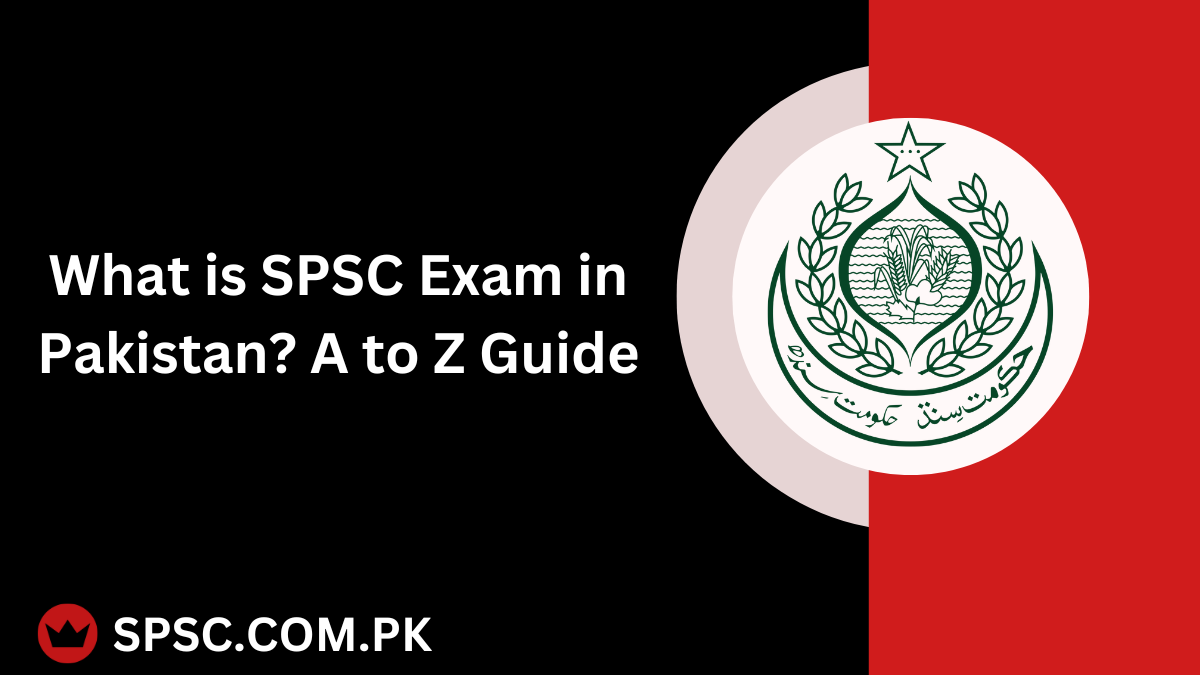The Sindh Public Service Commission (SPSC) exam is a gateway for candidates in Sindh, Pakistan, to enter prestigious government positions. It offers opportunities in civil services, education, healthcare, administration, and more. This comprehensive A to Z guide will walk you through everything you need to know about the SPSC exam—from eligibility criteria to preparation strategies—so you can plan your path toward success with confidence.
What is SPSC?
The Sindh Public Service Commission (SPSC) is a provincial government institution established in 1989. Its primary role is to conduct competitive exams and recruit eligible candidates for various Grade-17 and above government posts within Sindh. SPSC operates under the constitutional framework and ensures transparency, merit, and fairness in the selection process.
Posts Offered Through SPSC
SPSC recruits for a wide range of important positions across different departments of the Sindh government, including:
- Assistant Commissioners (AC)
- Section Officers
- Excise and Taxation Officers
- Lecturers & Professors (College Education)
- Medical Officers
- Engineers
- Police officers (DSPs via CCE)
- Labour and Industrial Relations Officers
These roles carry authority, job stability, social respect, and numerous growth opportunities.
Types of Exams Conducted by SPSC
SPSC conducts various types of competitive exams depending on the nature of the posts:
- Combined Competitive Examination (CCE): This is the most significant and comprehensive exam, often referred to as PCS (Provincial Civil Services).
- General Recruitment Exams: For specific advertised positions such as lecturers, medical officers, or engineers.
- Departmental Exams: For promotions or confirmations of already serving government employees.
- Screening Tests: Objective-type tests to shortlist candidates for written or interview stages.
Eligibility Criteria
To appear in an SPSC exam, candidates must fulfill the following basic requirements:
- Education: Minimum Bachelor’s degree (BA/BSc/B.Com or equivalent) from a recognized university.
- Age Limit: Generally between 21 and 30 years. However, age relaxations up to 5 years may apply for government servants, minorities, and women.
- Domicile: Applicants must hold a valid Sindh domicile and permanent residence certificate (PRC).
Each post may have additional specific criteria, such as relevant field experience or subject specialization.
How to Apply for SPSC Exams
The application process is simple and completely online. Here’s how it works:
- Visit the official website: www.spsc.gov.pk
- Create an account and log in to the candidate portal.
- Browse advertised vacancies under the “Jobs” section.
- Submit online application: Fill out the form, upload documents, and pay the challan fee (usually between PKR 500 to 1000).
-
Receive Roll Number Slip before the exam date via the website or email.
SPSC Exam Format and Syllabus
The exam format varies depending on the position, but generally consists of the following stages:
- Preliminary Test (for PCS/CCE): Multiple Choice Questions (MCQs) on general knowledge, current affairs, and English.
- Written Examination: Divided into compulsory and optional subjects, depending on the exam.
- Psychological Test: Conducted in PCS to assess personality traits.
- Viva Voce/Interview: Final assessment stage where candidates are judged on confidence, knowledge, and suitability for public service.
Common Compulsory Subjects Include:
- English Essay & Grammar
- General Knowledge & Current Affairs
- Pakistan Studies
- Islamic Studies or Ethics (for non-Muslims)
- Sindhi or Urdu (Provincial Language Paper)
Optional Subjects: Candidates choose from a wide list such as International Relations, Sociology, Political Science, Public Administration, Law, etc., based on their background or interests.
Preparation Strategy for SPSC
Success in SPSC requires a clear strategy and disciplined study plan:
- Understand the Syllabus: Download the latest syllabus from the SPSC website and stick to it.
- Read Daily Newspapers: The Dawn and Express Tribune are great for improving English and current affairs knowledge.
- Study Past Papers: Analyze trends, repeated questions, and the difficulty level of previous exams.
- Use Trusted Books: Publishers like Dogar, Caravan, JWT, and Advanced offer comprehensive study materials.
- Practice Mock Tests: Take timed tests to build speed, accuracy, and confidence.
- Join Study Groups: Use online communities on Facebook, WhatsApp, and YouTube for sharing resources and guidance.
- Revise Regularly: Set aside dedicated time for revision, especially for subjects like English essay and optional papers.
Interview Preparation Tips
The interview or viva voce is a crucial stage. Follow these tips:
- Dress Professionally: Wear neat and formal attire suitable for a professional environment.
- Be Confident: Maintain eye contact, speak clearly, and project confidence.
- Stay Updated: Be aware of recent developments in national and international affairs.
- Know Your Subject: Be well-prepared on your degree subject and optional papers.
- Display Ethics and Maturity: Interviewers appreciate balanced opinions and responsible attitudes.
Common Challenges Faced by Candidates
- Lack of Guidance: Many aspirants don’t know where to start or what to study.
- English Proficiency: Essay writing and comprehension can be difficult for non-native speakers.
- Time Management: Working or studying candidates may struggle to manage prep time.
- Confusion About Optional Subjects: Choosing the right optional subject is a key decision.
- Syllabus Ambiguity: SPSC syllabus is sometimes broad and unclear.
Despite these challenges, dedication and the right strategy can help overcome them.
Benefits of Clearing the SPSC Exam
- Job Security: Government jobs come with long-term stability.
- Financial Benefits: Regular salary, pensions, bonuses, and other allowances.
- Respect and Authority: Civil servants are held in high regard in society.
- Growth Opportunities: Regular promotions and departmental training enhance careers.
- Public Service Contribution: You get the chance to work for the betterment of society.

